Perform a free Connecticut warrant search in seconds via the convenient databases linked throughout this streamlined resource. Knowing about active warrants can help individuals take steps to resolve any difficulties, and records of warrants are publicly accessible thanks to both state and federal public record laws.
Bench, arrest and other warrant information can all be found seamlessly once citizens know where to look. This brief resource offers aggregate links, agency contact information, and step-by-step guidance for retrieving warrant details on anyone wanted in Connecticut.
Are Warrant Records Publicly Available in CT?
There are several types of warrants used in Connecticut, and most are publicly available. Some can be found through online searches, although others may require a phone call or visit to the relevant agency.
The Connecticut Freedom of Information Act (FOIA) regulates the availability of government records in the state.1 Some judicial records are exempt from FOIA requests. This is because docket sheets and tape recordings of court proceedings aren’t considered public records.
In addition, there are exemptions to help protect the privacy of people involved and to limit the harm that access to these records may cause. In particular, cases involving juveniles aren’t typically available to the public.
Finally, some warrants may be kept from the public to ensure the effectiveness of law enforcement actions. This is often the case with search warrants. It may also impact arrest warrants if they haven’t yet been executed. Warrants are separate to criminal and arrest records, though this information is also publicly available in Connecticut.
Necessary Details for Executing a Connecticut Warrant Search (Insights)
Connecticut has a range of records available to the public, including a variety of warrant information. Some are available online, while others require a phone call or in-person visit to access.
Warrant information is kept by a number of different government agencies. The best department to contact depends on the type of warrant a person is searching for.
A person searching for a warrant must have certain information up front. Knowing a first and last name plus the state where the person lives or where the warrant was issued ensures accuracy in the search. It’s especially helpful to know if the individual was traveling or has moved from another state so the searcher can look in the right databases.
Additional details, such as the person’s date of birth and the city where they reside, can narrow down the search.
State and municipal level governments may be able to help those conducting a Connecticut warrant lookup. The state’s counties don’t have a role in governance, so there are no county-level departments that provide this information. Those looking for warrants for federal crimes can get assistance from U.S. agencies.
Accurate information is found by going to the agency dealing with the offense. However, for those who don’t have the details needed for this search, it can be quicker to search the broadest region first then narrow the search as more information is acquired.
How To Check Who Has a Warrant in Connecticut
Discovering any outstanding warrants can help an individual take action to resolve legal issues. Taking action is likely to have better outcomes than allowing law enforcement to make an arrest. Connecticut has a number of avenues for people to explore to find out if they have active bench or arrest warrants.
The primary place to conduct an online Connecticut warrant search is the State Judicial Branch. It maintains a database where people can search outstanding arrest warrants.2 This list includes warrants for violation of probation or parole and failure to appear in court.
The system can be accessed with just the first two letters of an individual’s last name. Alternatively, it’s possible to search by town or court location. Adding more information, such as first name or birth year, can help narrow down the results.
The following information is included in the database:
- First & Last Name
- Birth Year
- Last Known Address
- Date Warrant Was Issued
- Docket Number
Some records include a photo of the person. In addition, the searcher may be able to click on the docket number for further information. This provides details about the offense, court, arresting agency and bond, however not all records provide access to this extra information.
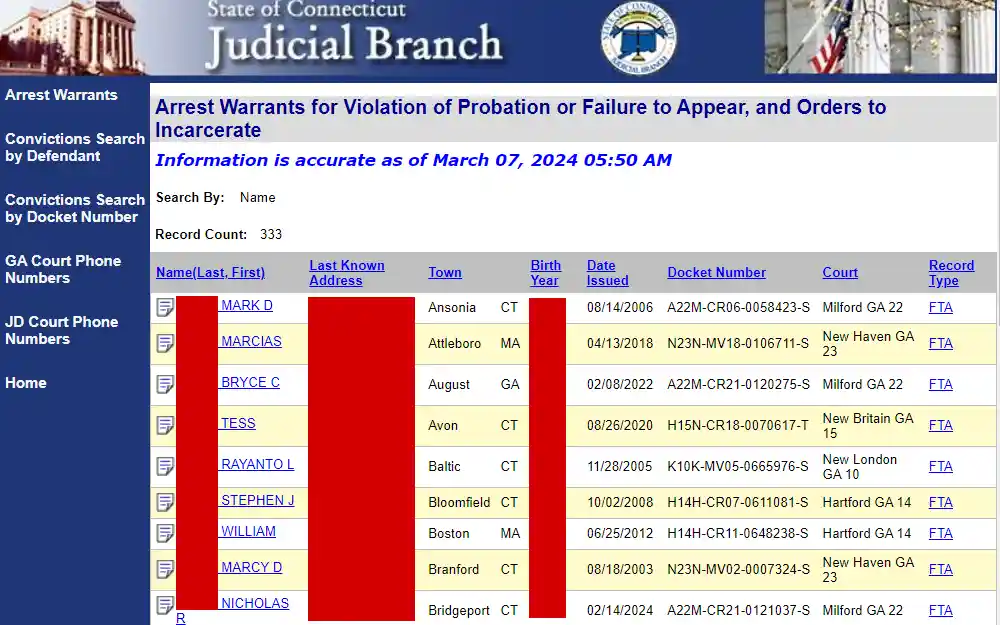
Outstanding warrant information isn’t added to the publicly available database if it’s for a juvenile offender. In addition, there won’t be information listed if the Judicial Branch believes that the details may endanger the safety of anyone, including the offender or the general public.
This system doesn’t contain information about all types of warrants, and individuals may have to expand their search to find the information they seek. Although the Division of State Police doesn’t state that they provide assistance with these searches, it’s likely that they can access outstanding warrant records.3 Searchers can phone district headquarters or visit in person.
It’s important to note that an individual can be arrested if they go to a police station in person and have an active warrant.
Western District HQ
452-B Bantam Road
Litchfield, CT 06759
Phone: (860)626-7975
Central District HQ
269 Maxim Road
Hartford, CT 06114
Phone: (860)706-5656
Eastern District HQ
15A Old Hartford Road
Colchester, CT 06415
Phone: (860)465-5470
In addition to district headquarters listed above, there are other Connecticut Police Facilities located throughout the state that may be easier to visit in person.4
The Office of Policy & Management compiles monthly arrest warrant reports.5 Although the website only offers warrant statistics, it does state that the program manager can help people looking for information about individual warrants. The office can be contacted at (877)312-7807.
Connecticut State Marshals are responsible for serving civil warrants, including capias and child support warrants. However, each state marshal operates as an independent contractor, so it’s unclear how helpful they can be to people searching for outstanding warrants.
The Judicial Branch does maintain a list of all state marshals for people who wish to explore this source of information.
Conduct a Connecticut Warrant Search via the State’s Judicial Districts
Counties in Connecticut don’t have an independent government; they only exist as geographical regions. This means there’s no county courts. In addition, sheriff’s offices no longer exist in the state and the responsibility of serving warrants is now undertaken by state marshals and municipal police.
However, it’s still possible to check for warrants at a local level through Connecticut Judicial Districts.6
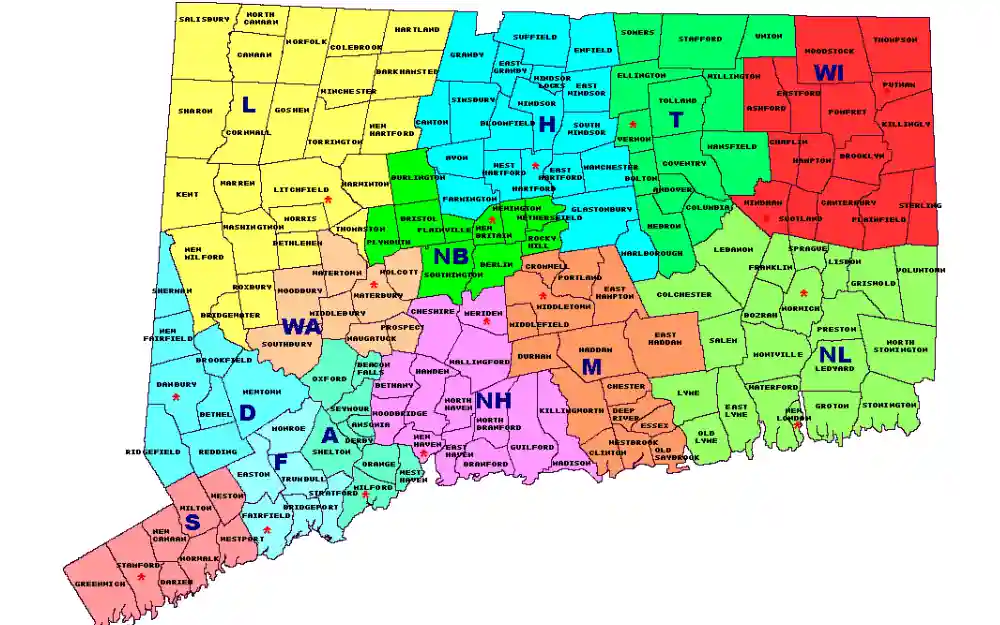
These districts tend to run along county lines and there are staff available at courthouses to assist the public.
Fairfield Judicial District
1061 Main Street
Bridgeport, CT 06604
Phone: (203)579-6527
Hartford Judicial District
95 Washington Street
Hartford, CT 06106
Phone: (860)548-2700
New Haven Judicial District
235 Church Street
New Haven, CT 06510
Phone: (203)503-6800
Check With Municipal Courts & Law Enforcement Agencies in Connecticut for Warrant Information
As Connecticut has a statewide warrant search system, city police departments don’t generally have online searches available for residents. However, municipal police are often able to assist with warrant searches either in person, by mail or over the phone. The best person to speak to is the officer or person in charge of processing warrants.
Requesters should keep in mind that if they have an active warrant and attend a police station, they may be arrested.
| Police Department | Address | Phone Number |
| Bridgeport Police Department | 300 Congress Street Bridgeport, CT 06604 |
203-581-5270 |
| Stamford Police Department | 725 Bedford Street Stamford, CT 06901 |
203-977-4409 |
| New Haven Police Department | 1 Union Avenue New Haven, CT 06519 |
203-946-6316 |
| Hartford Police Department | 253 High Street Hartford, CT 06103 |
860-757-4000 |
| Waterbury Police Department | 41 Avery Lane Waterford, CT 06385 |
860-442-9451 |
| Norwalk Police Department | 1 Monroe Street Norwalk, CT 06854 |
203-854-3000 |
| Danbury Police Department | 375 Main Street Danbury, CT 06810 |
203-797-4611 |
| New Britain Police Department | 10 Chestnut Street New Britain, CT 06051 |
860-826-3000 |
| Bristol Police Department | 131 North Main Street Bristol, CT 06010 |
860-584-3011 |
| Meriden Police Department7 | 50 West Main Street, Meriden, CT 06451 | 203-238-1911 |
Expand Your Search Beyond CT & Access Federal Warrants
Federal warrants are less common than those from state or municipal agencies. Despite this, it’s possible to have an outstanding warrant for a federal crime.
People who wish to search for a federal warrant can start with Public Access to Court Electronic Records, also known as PACER.8 This allows searchers to look for federal records from appellate, bankruptcy and district courts.
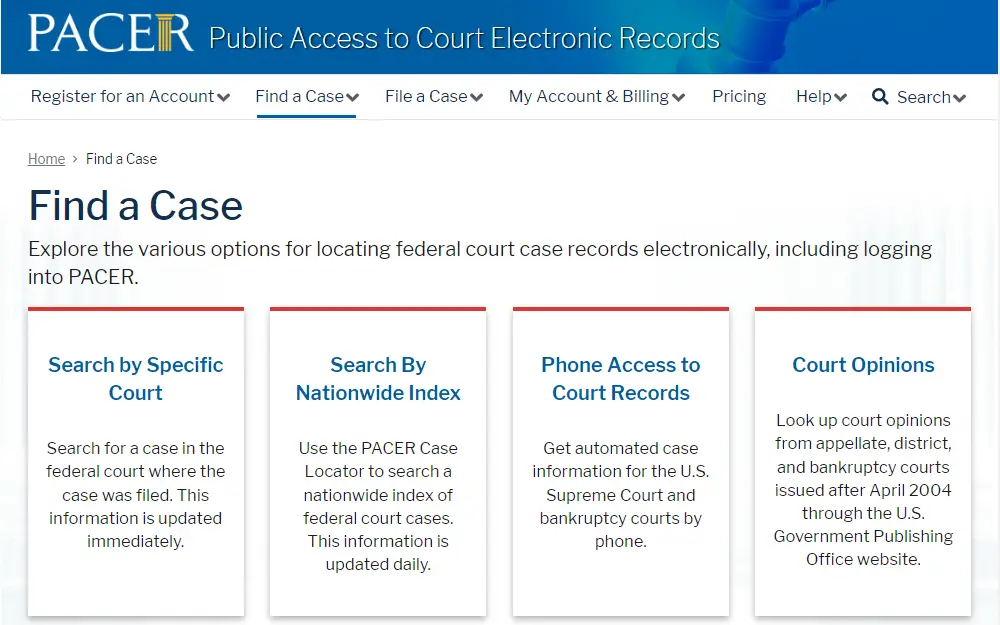
Federal arrest and search warrants are available through PACER. To find them, enter the person’s name, click “Case Number” and select “Docket Sheet”, “Docket Report” or “History/Documents”.
PACER does charge $0.10 for each page accessed using the system. As the charge is for the number of pages generated by a search, it’s best to be specific when entering parameters to avoid excess fees.
The US Marshals Service is responsible for executing most federal warrants. A Freedom of Information Act (FOIA) request to this agency can also provide searchers with relevant information. There’s an online system that lets the public submit requests, although many people find it easier to work with an attorney.10
In addition, the Marshals maintain a list of the 15 Most Wanted Fugitives. Similar lists are publicized by the Drugs Enforcement Agency (DEA) and the Federal Bureau of Investigation (FBI).11
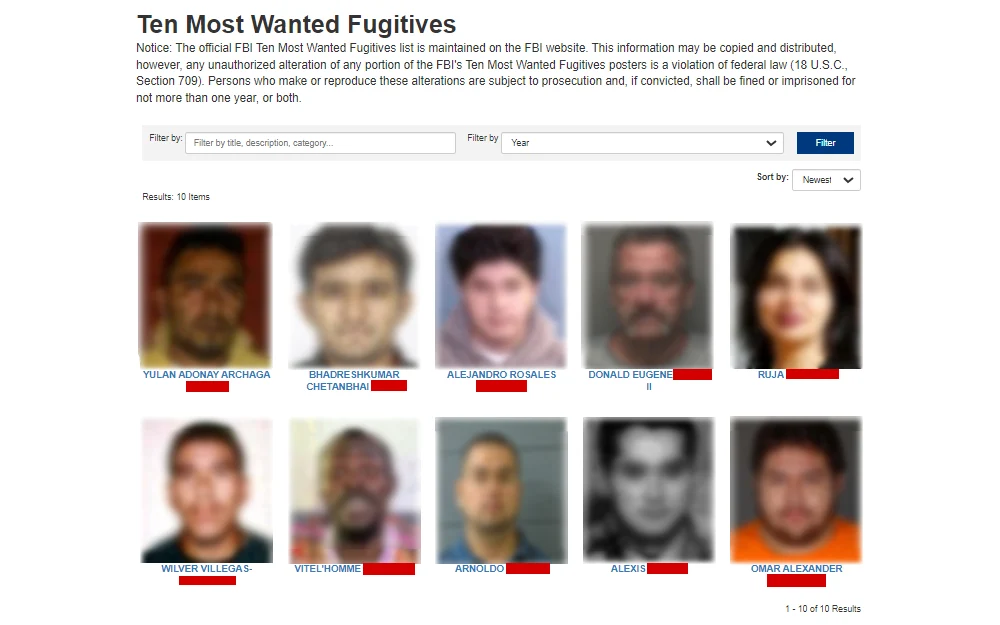
All three pages have names and images of dangerous fugitives, along with a short description of their charges.
Types of Warrants in Connecticut & Their Definitions
Warrants come in a variety of types that have different uses. All types of warrants can be active or outstanding. This simply means that it hasn’t been executed or resolved.
Below are some of the most common records that can be found when looking up warrants in Connecticut.
Arrest Warrants: These warrants give law enforcement permission to arrest an individual. They are only issued when investigators can convince a judge that there’s reason to believe the person committed a crime. For less serious offenses, a person may only receive a summons to appear in court.
Bench Warrants: Bench warrants are issued by a judge from the bench. They’re typically used when a person doesn’t appear in court or doesn’t comply with orders.
Probation and Parole Violation Warrants: These warrants are issued when an individual doesn’t follow the conditions of their probation or parole. A judge may issue a warrant for arrest so the court can decide whether the person must be incarcerated.
Traffic Warrants: Traffic warrants are a type of bench warrant issued when a person receives a traffic ticket but doesn’t pay the fine or appear in court.
Child Support Warrants: Child support warrants can be issued from the bench in custody and child support cases. The warrant is generally used when a person doesn’t appear at court when required or when they haven’t made support payments.
Capias & Capias Pro Fine Warrants: Capias and capias pro fine warrants are issued to compel an individual to obey the court. Capias warrants let a person be detained until their court date to ensure that they appear. Capias pro fine warrants let a person be taken to court to explain why they haven’t followed a court order, usually in relation to paying a fine or restitution.
Fugitive Warrants: Fugitive warrants are used when a person wanted for arrest has fled the location where the crime occurred. They help law enforcement work cooperatively to capture wanted persons by informing authorities in other jurisdictions. A fugitive warrant lets the arrestee be extradited to face their original charges.
Search Warrants: These warrants give law enforcement permission to search a person’s home, car or other personal property. The warrant must specify what area will be searched and the evidence that is being sought. Before providing the warrant, the judge must be convinced that there’s probable cause to believe the evidence will be found in that area.
What To Do if You or Someone Else Has a Warrant in Connecticut
It’s best to be proactive when it comes to resolving an active warrant. A records search may reveal an outstanding warrant for a friend or family member.
The first step is generally to inform the person. They can then take action to solve their legal concerns. If the searcher is worried about the safety of themselves or others, they can inform law enforcement.
The Connecticut State Police also have a tip line.4 The Suspicious Activity Reporting Form allows people to send tips online, or the department can be contacted at (860)685-8190.12
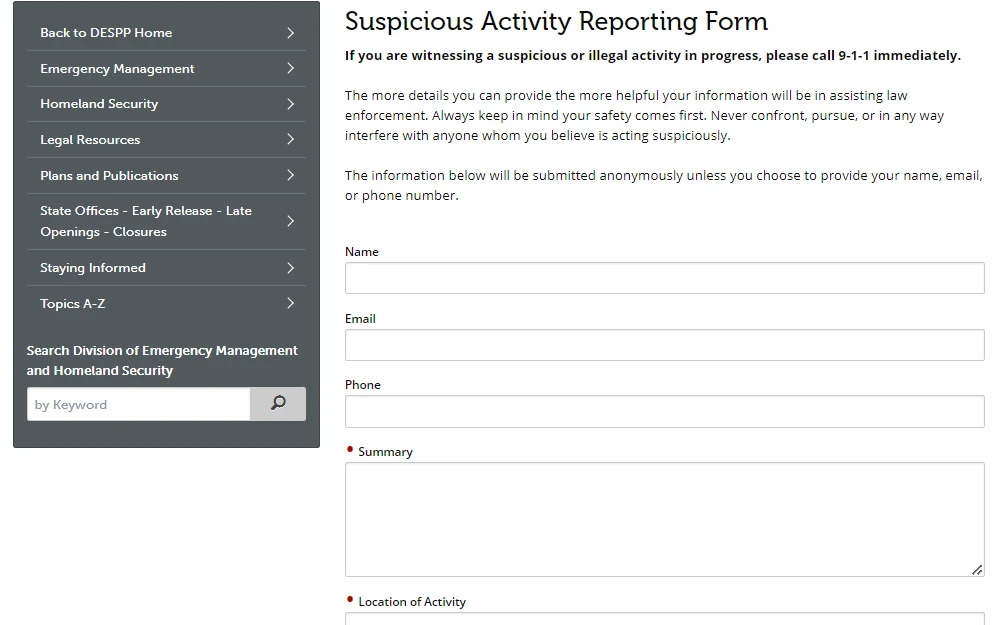
There is a separate tip line for reporting probation violators.13 The line may be reached by phone at (877)235-1907 or by email at [email protected].
If an individual discovers they have an outstanding warrant, there’s a number of steps they may take. If the warrant is for a minor offense such as not paying a traffic ticket, it may be possible to pay the fines or set a court date. The state has answers to frequently asked questions about paying traffic tickets.14
For more serious offenses, it’s often better to obtain legal advice. A lawyer can investigate the warrant, communicate with law enforcement and take steps to protect the individual’s rights. Finally, the person can choose to turn themselves in.
For those who intend to go to law enforcement, it’s important to make preparations first. Communicate with family so they know what’s going on, get in contact with legal aid and call a bail bondsman so there’s help to get free as soon as possible. With the steps outlined in this resource, a Connecticut warrant search can assist people to get control of their lives.
For additional insight into anyone throughout this state, you can refer to the steps for finding all free public records in CT (mugshots, inmates, probation, parole, vital records, and more) as well as the Connecticut arrest and criminal history lookup instructions.
References
1Connecticut Freedom of Information Commission. (2023, June 23). The Connecticut Freedom of Information Act. Retrieved March 7, 2024, from <https://portal.ct.gov/FOI/Quick-Links/The-FOI-Act>
2State of Connecticut Judicial Branch. (2024). Arrest Warrants for Violation of Probation or Failure to Appear, and Orders to Incarcerate. Retrieved March 7, 2024, from <https://www.jud2.ct.gov/VOP/>
3Connecticut State Department of Emergency Services and Public Protection. (n.d.). Home. Retrieved March 7, 2024, from <https://portal.ct.gov/DESPP/Division-of-State-Police/Home>
4Connecticut State Department of Emergency Services and Public Protection. (n.d.). Connecticut State Police Troops and Districts. Retrieved March 7, 2024, from <https://portal.ct.gov/DESPP/Division-of-State-Police/_old/Connecticut-State-Police-Troops-and-Districts>
5State of Connecticut Office of Policy and Management. (2024). Monthly Arrest Warrant Report. Retrieved March 7, 2024, from <https://portal.ct.gov/OPM/CJ-CJIS/CJ-Arrest-Warrant-Data/Arrest-Warrant-Data>
6State of Connecticut Judicial Branch. (n.d.). Connecticut Judicial Branch – Judicial Districts. Retrieved March 7, 2024, from <https://www.jud.ct.gov/directory/maps/JD/Default.htm>
7Meriden City Police Department. (n.d.). Records Division. Retrieved March 7, 2024, from <https://www.meridenct.gov/city-services/police/records-division/>
8Administrative Office of the U.S. Courts. (n.d.). PACER Case Locator. Public Access to Court Electronic Records (PACER). Retrieved March 7, 2024, from <https://pcl.uscourts.gov/pcl/index.jsf>
9Administrative Office of the U.S. Courts. (n.d.). Find a Case. Public Access to Court Electronic Records (PACER). Retrieved March 7, 2024, from <https://pacer.uscourts.gov/find-case>
10United States Marshals Service (USMS). (n.d.). Welcome to the United States Marshals Service (USMS) Freedom of Information Act (FOIA) Portal. Retrieved March 7, 2024, from <https://foia.usmarshals.gov/app/Home.aspx>
11Federal Bureau of Investigations. (n.d.). Ten Most Wanted Fugitives. Retrieved March 7, 2024, from <https://www.fbi.gov/wanted/topten>
12Connecticut State Division of Emergency Management and Homeland Security. (n.d.). Suspicious Activity Reporting Form. Retrieved March 7, 2024, from <https://portal.ct.gov/DEMHS/Homeland-Security/Suspicious-Activity-Reporting-Form/Suspicious-Activity-Reporting-Form>
13State of Connecticut Judicial Branch. (n.d.). Court Support Services Division – Adult Probation Services. Retrieved March 7, 2024, from <https://www.jud.ct.gov/cssd/adultprob.htm>
14State of Connecticut Judicial Branch. (n.d.). Traffic Violation / Complaint Ticket Frequently Asked Questions. Retrieved March 7, 2024, from <https://jud.ct.gov/faq/traffic.html#3>
